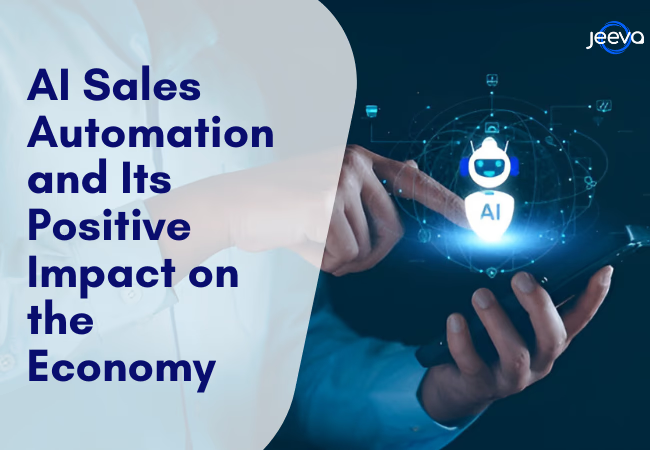December 2, 2024
Pratibha Bhattacharjee
Content Specialist
Artificial intelligence was not long a futuristic concept. Rather, sales professionals have incorporated the integration of AI into daily reality as they automate monotonous jobs, analyze immense data sets, and look for strategic optimization. Transformation is more than just an efficiency but a way through which business interacts with the customer, predicts market trends, and scales its business.
In this blog, we’ll explore the role of AI in sales, the industry trends driving its adoption, and the insights businesses can use to stay ahead in this evolving landscape.
The AI Revolution in Sales
AI in Sales as a Strategic Enabler
There is no more gut feel sales on manual effort. AI supports sales teams by giving them data-driven insights and predictive analytics. Sales strategies, which took weeks to build, can now be framed in real-time because AI algorithms can process terabytes of customer data in minutes.
Core Functions of AI in Sales
Automation of Repetitive Tasks:
AI tools such as chatbots and CRM systems take care of repetitive tasks like email responses, meeting scheduling, and lead qualification. This leaves the sales agents to concentrate on relationship building and closing deals.
Better Customer Insights:
AI-driven analytics tools give a 360-degree view of the customer journey, allowing for personalized engagement. These insights can predict customer needs, enhance satisfaction, and drive loyalty.
Predictive Lead Scoring:
AI identifies high-potential leads based on historical data, thereby reducing the guesswork in targeting the right prospects.
Real-Time Decision-Making:
AI enables sales teams to make informed decisions in real-time. Tools like Salesforce Einstein or HubSpot AI suggest the next best action to convert a lead or upsell a product.
Key Industry Trends Driving AI Adoption in Sales
1. Shift Toward Hyper-Personalization
Modern customers want tailored experiences. AI uses machine learning and natural language processing to analyze behavior, preferences, and the history of interaction between the customers and the company to produce very customized solutions. Platforms like Drift and Intercom use AI to dynamically create customer journeys.
2. The Emergence of Conversational AI
AI-powered chatbots and virtual assistants are redefining customer interactions. Unlike the traditional bots, conversational AI tools can understand context, detect sentiment, and carry out natural conversations. This enhances customer engagement as well as conversion rates.
3. Predictive Analytics and Forecasting
Predictive analytics tools like Gong and Clari help sales teams anticipate market trends and customer needs. By analyzing historical data and external factors, these tools allow companies to allocate resources efficiently and stay proactive in competitive markets.
4. AI-Powered CRM Systems
Nowadays, many CRM platforms use AI for a streamlined workflow and to improve the way of working. Some tools such as Zoho CRM and Microsoft Dynamics 365 include AI tools and offer features such as sentiment analysis, auto-suggested data entry, and wise reminders.
5. Connection with IoT and Big Data
The IoT is producing enormous amounts of data, and AI tools are now being integrated to process and interpret the information. It is most useful in industries like retail where data from connected devices can provide actionable insights for sales teams.
Insights for Leveraging AI in Sales
1. Focus on Data Quality
AI systems are only as good as the data they process. Businesses must pay great attention to data hygiene: accurate, up-to-date, and comprehensive datasets are what they need. A heavy investment in robust data management systems is the way forward to maximize the potential of AI.
2. Training and Upskilling on AI
In fact, sales teams need training before applying any of the AI tools. Enterprises should have workshops and a learning platform to teach staff on the use of these AI tools.
3. Tool Selection
All AI tools are not equal. It is the duty of firms to first understand their critical sales pain points and determine which AI tools can fulfill those requirements. For example:
To generate leads- Utilize platforms such as ZoomInfo or LinkedIn Sales Navigator.
For predictive analytics: go for Einstein Analytics or Clari.
4. AI-Human Equilibrium
AI is the best for data processing and prediction, but human instinct and emotional quotient are irreplaceable. The businesses need to aim for a perfect synergy where AI handles all the technicalities, while humans handle the relationship and strategic decision-making.
5. Continuously Monitor the ROI
AI implementations should be tracked to deliver tangible benefits. KPIs such as conversion rates, average deal size, and customer lifetime value should be tracked in order to measure ROI.
Challenges in Adopting AI for Sales
Implementing AI in sales may come with challenges despite the transformative potential: High Initial Investment: Implementing AI tools requires a significant upfront investment in technology and infrastructure.
Data Privacy Concerns: Use of AI to process customer data has to be in compliance with the increasing regulations like GDPR and CCPA.
Resistance to Change: Employees resist any change, and there are no proper understandings about what AI is. Clear communication will be the key to avoid this.
Integration Issues: They must integrate well with already existing tools and workflows so that a poorly integrated system does more harm than good.
Success Stories: AI Transforming Sales
1. Amazon
Amazon uses AI extensively in its sales strategy. From personalized product recommendations to dynamic pricing, the company leverages machine learning to optimize customer experience and drive sales.
2. Salesforce
Salesforce’s AI-powered Einstein platform helps businesses analyze customer data, predict outcomes, and recommend actions. Companies using Einstein report a 27% increase in lead conversion rates.
3. HubSpot
HubSpot's AI tools smoothen out marketing and sales processes while also providing features such as predictive lead scoring and email automation. Many businesses improve their efficiency and scale quicker using such tools.
4. Sephora
Sephora uses AI to uplift customer engagement. Its virtual assistant recommends products based on the customer's preferences which boosts satisfaction as well as sales
5. Jeeva. ai
Jeeva AI streamlines sales processes with AI-powered automation, offering features like intelligent lead qualification, personalized outreach, and real-time analytics. Empowering businesses to scale faster and close deals more efficiently, Jeeva AI transforms sales teams into productivity powerhouses.
The Future of AI in Sales
The adoption of AI in sales is expected to grow exponentially in the coming years. Here are some trends to watch:
Voice and Speech Recognition:
Tools like Gong are already analyzing sales calls for insights. The future will see more advanced voice recognition capabilities that can detect tone, sentiment, and intent in real-time.
Augmented Reality (AR) and AI Integration:
Retailers and e-commerce platforms explore AR for an enhanced virtual shopping experience. Combined with AI, it could offer relevant recommendations and demos.
AI for Emotional Intelligence:
Emerging AI tools are being trained to read customer emotions through text and voice, enabling more personalized interaction.
Proactive AI Assistants:
Unlike reactive systems, proactive AI assistants will predict customer needs and act on them without human intervention.
Final Words
The role of AI in transforming the sales landscape is undeniable. By automating mundane tasks, enhancing customer insights, and enabling real-time decision-making, AI is revolutionizing how sales teams operate. However, its successful adoption requires a strategic approach, focusing on data quality, training, and balancing technology with human expertise.
For businesses willing to adapt to this change, AI will provide a competitive edge in an increasingly dynamic market. Those who adapt quickly to new technology will be well-positioned to lead the next wave of innovation in sales.
In this fast-paced industry, the question is no longer whether to adopt AI but how quickly you can integrate it into your sales strategy. The time to act is now and leverage the power of AI in sales!
Get practical insights on how Jeeva’s AI sales agents are revolutionizing the AI landscape. Schedule a demo now.
Sales Automation
AI in Sales
Don't miss these
Sales
How to Choose the Right AI Sales Tools for Your Sales Team?
AI Sales Tools for Your Sales Team
AI sales agents
Sales Automation
Sales
How to Identify Bottlenecks in Your Sales Process with AI?
Your Sales Process with AI
AI sales agents
Sales Automation
AI in Sales
AI Sales Automation and Its Positive Impact on the Economy




